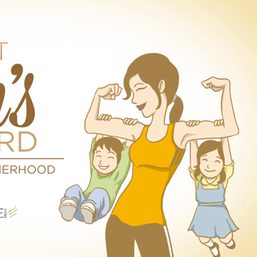SUMMARY
This is AI generated summarization, which may have errors. For context, always refer to the full article.

MANILA, Philippines – Has being a woman ever cost you a dream job or a promotion? You’re not alone.
Despite existing laws penalizing discrimination and violence against women, many still face hurdles in finding or keeping work.
Recent statistics from employment portal Jobstreet.com revealed that gender stereotypes persist when it comes to where women – and men – end up being hired.
Do we blame employers? Individuals who only apply for certain jobs? Or is this a symptom of the larger issue of how society perceives women in general? (READ: Looking for ‘young, female, pleasing’ applicants? Not right)
To answer these questions, Rappler and Pantene hosted “Work It: A forum on Gender and Job (In)security” last Saturday, March 29. Members of the government, leaders of non-governmental groups, and representatives from several industries came together to discuss the trends and issues that shape the Filipino woman’s workplace.
Singled out
Although statistics of violence against women remain higher among the service and informal industries, seeking a better paying job does not shield a woman from discrimination and abuse.
Among the most vulnerable are women who “stand out” because of their disability or sexual orientation.

Hannah Mae Aldeza, a blind call center agent, can type and operate a “normal” computer as well as sighted people. However, she used to get turned down for call center jobs by HR managers explaining that they didn’t have “the proper facilities” for persons with disabilities (PWDs).
Anne Lim from GALANG Philippines, Inc. shared how some members of their organization would be contacted for job interviews, but, upon showing up wearing non-“feminine” attire, will get told, “Sorry, hindi kami tumatanggap ng immoral (Sorry, we don’t accept immoral people).” Or worse, they’d be told to expect a call, but no follow up will take place.
Charlese Saballe from the Society of Transsexual Women of the Philippines (STRAP) shared that similarly transwomen who can’t land other jobs are pigeonholed into 3 industries: entertainment, beauty, and sex work. “We don’t get the work that we deserve… if we don’t have work how do we find the economic opportunity to survive?” she said.
The economic divide
Most of the panelists and representatives agreed that a woman’s independence is linked with economic power.
According to Jean Enriquez, Executive Director of Coalition Against Trafficking in Women-Asia-Pacific (CATWAP), those most susceptible to human trafficking are women from rural areas, where lack of income is prevalent. The problem worsens when disasters cease or interrupt regular sources of employment or revenue.

Age also diminishes a woman’s capacity to earn. According to Salve Basiano of the Confederation of Older Person’s Society of the Philippines (COPAP), the country’s labor laws can be discriminatory against aging persons. Retirement is imposed at age 65 to open up jobs for the unemployed youth. “It is not the old people’s responsibility to give jobs to the young ones. It is the government’s responsibility to give jobs to everyone,” she said.
But other industries are becoming liberating avenues for women. The call center industry, for example, enabled the lifting on the ban of night work for women. It does not also use age or marital status as a hiring requirement.
According the Fire Sia from the business process outsourcing (BPO) sector, most call centers in the Philippines have improved in terms of hiring LGBTQs and honoring maternity rights, even for single mothers. This trend is significant; given that the BPO industry is currently the 3rd largest industry in the PH, with 10 million call center agents currently under its wing.
Double duties, double burden
Vina Rivera, a human resources manager, said that for most private industries, HR practitioners do try their best to counter employers who hold prejudices against potential women employees. But Vina explained that sometimes, it’s the women themselves who turn down opportunities. The common reason is they did not want to neglect their families and children.
Most of the representatives said they could relate to the dilemma of a woman being ‘forced’ to choose between domestic responsibilities and moving up the career ladder.
Juno Parungao, a professor, narrated how when applying for her PhD, panelists would ask her why she doesn’t plan to get married or have children at her age. But they never asked these questions to male applicants. She gets labeled as a “spinster,” while the single men are called eligible “bachelors.”
Osang Palma of Malayang Tinig ng Kababaihan (MATINIK) said that for many women from the informal sector, assuming responsibility for domestic work is not really a woman’s natural prerogative. Rather, it is society that confines them to these choices.
But when a woman solely focuses on domestic work, her economic and social freedom is compromised.

Beth Angsioco, head of the Democratic Socialist Women of the Philippines (DSWP), believes the solution is to redefine our notion of work. She said, “All economic activities should be considered work. And all work done by women, even in terms of reproduction, should be considered work because they indirectly contribute to the economic conditions of our society.”
The state and the stakeholders
Jean pointed out the many other issues that are not being addressed from the “invisible” women sector. Informal laborers, rural dwellers, and indigenous people are among those who lack the chance to express their grievances. Everyone must exert extra effort to make women from these sectors heard.
In light of these stories, the women from the government assured the representatives that they are not giving up the fight for women’s rights – and it’s not just in the workplace.

Luvy Villanueva from the Philippine Commission on Women (PCW) reiterated that the government has good policies and programs in place. These only have to be implemented well, especially at the local level. “Ang gusto kung makita (What I hope to see) is that women on the ground will be empowered to make demands that these services be given to them,” she said.
Riza Hontiveros, current AKBAYAN chairperson, said that it’s the sexist and patriarchal institutions that we need to challenge. The government plays an important role, but the private sector also needs to give higher value to a woman’s contribution to a company or an industry. “There’s no woman who doesn’t work. Everything we do is work,” she said.

Towards the end of the forum, Senator Pia Cayetano said that giving men and women identical rights is not the same as giving them equal opportunities. The whole society needs to adapt its mindset to understand what women really need. “Society must step up and say ‘we must bend the rules’ in order for women to have equal opportunities,” she said.
Until true gender equality becomes a reality, a woman’s work is never done. – Rappler.com
This forum was anchored by Ana Santos and Nikki Luna. Watch the main part of the program below. You can also view all the full forum here.
Add a comment
How does this make you feel?



There are no comments yet. Add your comment to start the conversation.